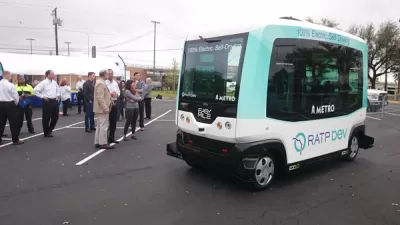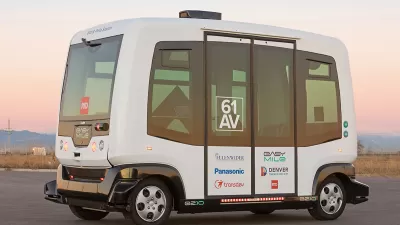While it might be easy to convince public officials to sell driverless technology as a flashy solution to mobility deficits—the math still doesn't justify the expense.

"Add Arlington, Texas to your mental list of cities conducting local tests of driverless shuttles," according to an article by Greg Roberts.
"On March 28, the City Council of Arlington, Texas approved a six-month lease of two EZ10 driverless shuttles from the French startup EasyMile, with a six-month option to renew," adds Roberts. "The vehicles, which can transport up to a dozen people at a time, will operate on a fixed course between parking lots and venues in Arlington’s entertainment district."
The question posed by Roberts in light of this news, however, is whether such test programs are worth the cost. In Arlington's case, the city is paying $270,000 to lease the two vehicles for two months. If the city had simply paid for two Ford Transit passenger vans of similar size and paid drivers to occupy the vehicles, the price would have come out to about $113,000 over the course of six months. Roberts notes that the gap between the two systems would be narrowed if extended for a full year.
The point: driverless technology is not yet a low-cost option, much less a cost-saving solution for cities and regions, like Arlington, looking for a way to improve public transportation options.
FULL STORY: Cities Now Exploring Autonomous Buses – But Is It Worth It?

Planetizen Federal Action Tracker
A weekly monitor of how Trump’s orders and actions are impacting planners and planning in America.

Maui's Vacation Rental Debate Turns Ugly
Verbal attacks, misinformation campaigns and fistfights plague a high-stakes debate to convert thousands of vacation rentals into long-term housing.

Restaurant Patios Were a Pandemic Win — Why Were They so Hard to Keep?
Social distancing requirements and changes in travel patterns prompted cities to pilot new uses for street and sidewalk space. Then it got complicated.

In California Battle of Housing vs. Environment, Housing Just Won
A new state law significantly limits the power of CEQA, an environmental review law that served as a powerful tool for blocking new development.

Boulder Eliminates Parking Minimums Citywide
Officials estimate the cost of building a single underground parking space at up to $100,000.

Orange County, Florida Adopts Largest US “Sprawl Repair” Code
The ‘Orange Code’ seeks to rectify decades of sprawl-inducing, car-oriented development.
Urban Design for Planners 1: Software Tools
This six-course series explores essential urban design concepts using open source software and equips planners with the tools they need to participate fully in the urban design process.
Planning for Universal Design
Learn the tools for implementing Universal Design in planning regulations.
Heyer Gruel & Associates PA
JM Goldson LLC
Custer County Colorado
City of Camden Redevelopment Agency
City of Astoria
Transportation Research & Education Center (TREC) at Portland State University
Jefferson Parish Government
Camden Redevelopment Agency
City of Claremont




























